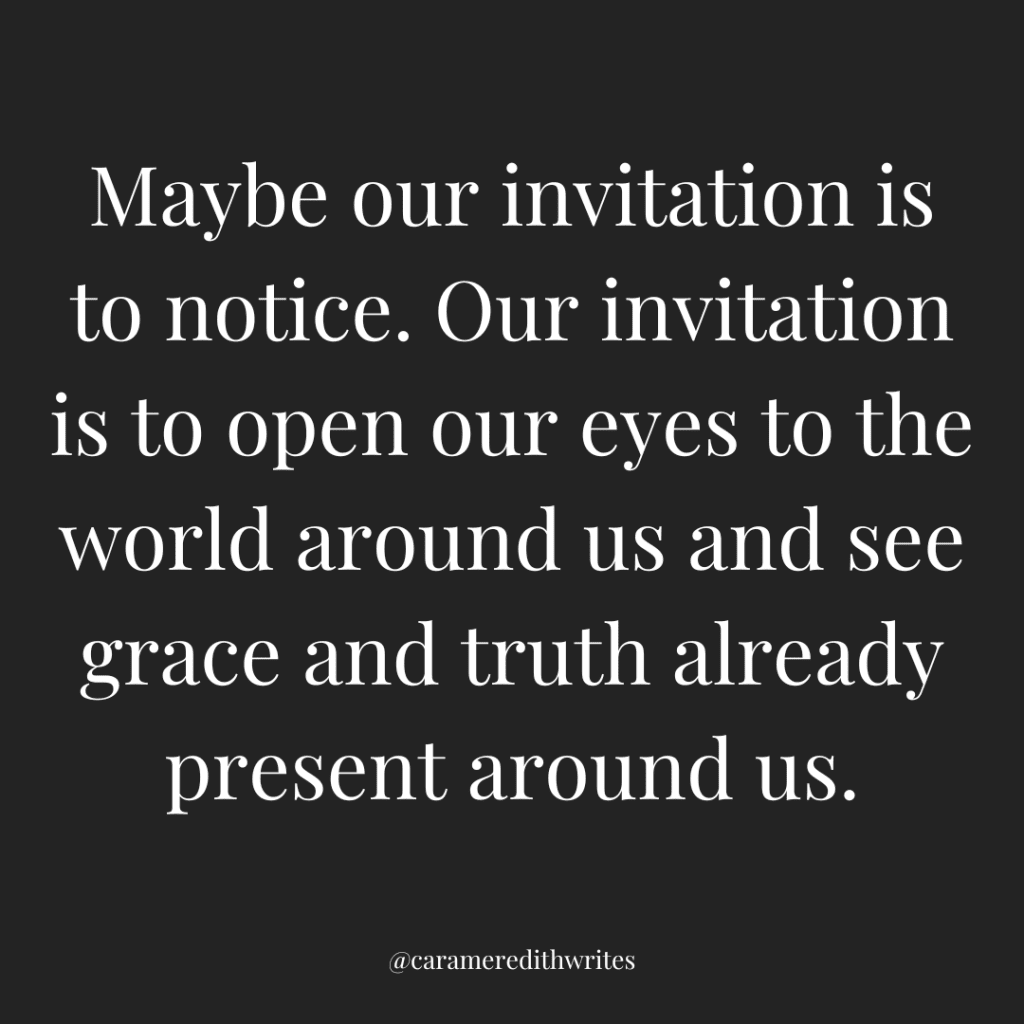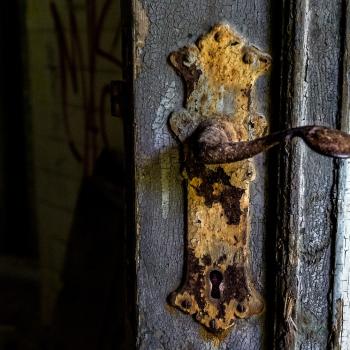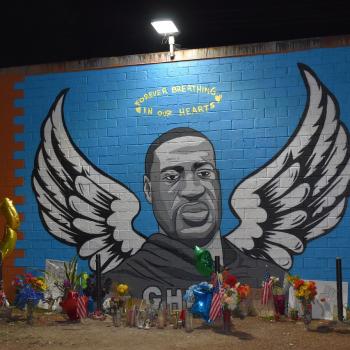Sometimes, our invitation is simply to notice.
When I walk through the backyard garden, I notice when a weed pops up in the bed of garlic. When I browse the aisles of Trader Joe’s, I notice when a new tub of queso surfaces up on a refrigerator shelf. When I poke my head over the couch in the living room, I notice when bunched up pairs of dirty stray socks have not made it to their proper resting place in the laundry room.
These are but minor examples when it comes to noticing, but they are examples of noticing nonetheless.
For all of us in this room, a bigger, deeper noticing happened this last week following the results of the Presidential election. When a “majority of American voters decided Donald Trump was their preferred choice for president,” as Bishop Austin said in an email the next morning, “His supporters are thrilling and his opponents are despairing. I am sure we have members of our diocese experiencing both of these polarized emotions.”

We too noticed these things, for each one of us noticed the emotions that came as a result of both the popular and electoral college vote. We noticed, once again, or perhaps for the hundredth time, how divided our country is, perhaps now more than ever before. We noticed how, just as some of our family and friends, and also, maybe ourselves, across the U.S. felt buoyed by great celebration and elation, many of our family and friends, and also, maybe ourselves, felt overcome by despair and sadness.
We noticed and we notice, because noticing is a natural part of being human. For noticing, as you may recall, is sometimes the invitation.
I remind us of noticing, because I was reminded of it in this week’s Gospel reading – as well as in each of the other readings before us.
It is Naomi’s noticing of Ruth’s lack of security that prompts her to instruct her daughter-in-law to go to the place where Boaz lies, and uncover his feet, and lie down – a noticing that led to the lineage of Jesus.
In Psalm 127, it is the psalmist’s noticing of the one who builds and the one who guards, which then prompts him to instruct that we “stop eating the bread of anxious toil,” for it is the Lord who gives us sleep.
And in Hebrews 9, it is the unknown author’s noticing of Christ that entered heaven on our behalf, who only had to suffer once, and not again and again.
But it is Jesus’ noticing of the widow I most want us to pay attention to today.
Mark 12 begins with a rather ominous warning. Jesus says, “Beware of the scribes, who like to walk around in long robes and to be greeted with respect in the marketplaces and to have the best seats in the synagogues and places of honor at the banquets!” He goes on to say that these scribes will devour widows’ houses, and “for the sake of appearances say long prayers.” No sooner does he declare that these same men will receive the greater condemnation than the passage takes a turn and he begins to put words to noticing.
Sitting opposite the treasury, Jesus begins to see all the people who have come to the temple to give money. A crowd of folks is there, including many rich people who put in large sums. It’s here that Jesus notices a poor widow: she comes and puts in two small copper coins, worth only a penny.
These same coins, as Jesus goes on to explain, are worth more than everyone else who happens to be dropping in handfuls of coins – “for all of them have contributed out of their abundance, but she, out of her poverty, has put in everything she had, all she had to live on.”
It’s a passage you’ve perhaps heard before, the unnamed widow often the go-to narrative when it comes to giving generously to the work of the church. But as Debie Thomas muses, “Centuries of stewardship sermons notwithstanding, Jesus never commends the widow, applauds her self-sacrifice, or invites us to follow in her footsteps. He simply notices her, and tells his disciples to notice her too.”
After all, as she then writes, Jesus “sees what everyone else is too busy, too grand, too spiritual, and too self-absorbed to see,” for “Jesus’ eyes are ever on the small, the insignificant, the unloved, and the hidden.”
What might you be invited to notice today?
How then are we being invited to do as Jesus did, and notice the small and the insignificant, the unloved and the hidden among us?
How has this noticing become reality in a week like this last one?
Perhaps like some of you, when a hard week happens, I can feel like I’m on a wild roller coaster of emotions. When this happens, I heed the imperative to rest and cozy up under a pile of snuggly blankets and check in on my loved ones and read as many fiction books as possible. I try not to produce or even try and find any answers for all of my questions, but I instead, try to be gentle with myself and with others.
This, of course, is not about me, but in hard times and in this gentleness too, I often do the only thing I can do: I take up noticing, once again. What do I notice about the people around me? What do I notice about our country and about the Church? What do I notice about those of us who call ourselves Christians, who try and follow in the way of Jesus?

Maybe, when we ask ourselves these questions about noticing, we’ll find that not a whole lot has changed. As Trinity Church, an Episcopal parish in New York City, proclaimed on Wednesday, “Our mission today is the same as it was yesterday and will be tomorrow: To love our neighbors as ourselves. To feed the hungry and welcome the stranger. To uphold the dignity of every human being. To support, in word and deed, those who are marginalized or made to feel “less than.” To be peacemakers in a time of strife.”
Is this not our mission as well?
Whatever it is for each of us, maybe our invitation is to notice. Our invitation is to open our eyes to the world around us and see grace and truth already present around us. Our invitation is to look for the God that is already present and working around us, and to fix our eyes upon the one who is already real within us. And our invitation is to notice the God who calls us to choose the good, the just, the holy – often over and over and over again.
For sometimes our invitation is simply to notice.
—
This is a sermon preached on November 10, 2024 at St. Paul’s Episcopal Church in San Rafael, California. If you liked this post, you might also like “Death and Life: What Does it Mean for Us to See?” Here’s to noticing!













